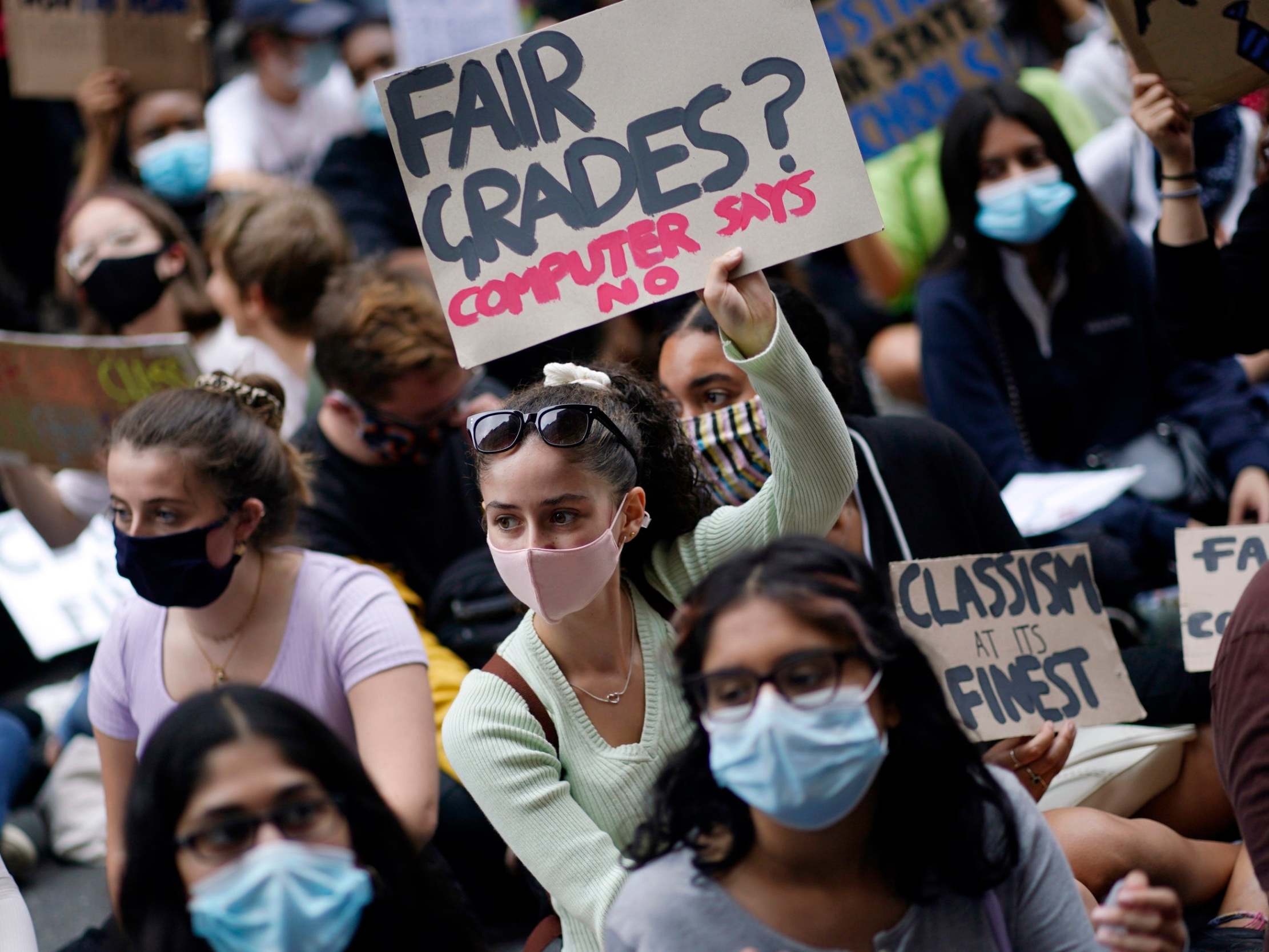A-level exam chaos: Ofqual’s controversial algorithm to be reviewed, regulatory body confirms
Students can now take teacher-assessed grades following outcry at system

There will be a review into how Ofqual’s statistical model designed to calculate this year’s exam grades was developed, a regulatory body has said.
A-level and GCSE students have now been allowed to take their teacher-estimated grades if they are higher than moderated ones, following outcry over the controversial grading system which downgraded tens of thousands of A-level results.
The Ofqual – England’s exam regulator - algorithm was meant to moderate the process of awarding grades in the country, preventing teachers awarding what the exams watchdog described as “implausibly high” marks to pupils. It came under fire over its perceived unfairness and the way it particularly appeared to penalise bright children from disadvantaged schools.
The Office for Statistics Regulation said they will review to what extent qualifications’ regulators in the UK developed their models in line with the principles set out in the code of practice for statistics.
It will not review the implications of the model on individual results or take any view on the most appropriate way to award grades in the absence of exams, it added.
The review comes after the The Royal Statistical Society (RSS) wrote to the OSR highlighting its concerns about the models used to determine students’ grades following the cancellation of exams during the coronavirus outbreak.
GCSE and A-level students in England, Wales and Northern Ireland have been allowed to receive grades based on their teachers’ estimates, if higher than moderated grades, following outcry.
Scotland also made a U-turn after its students protested over the downgrading of tens of thousands of results in moderation.
The chairman of Ofqual has said there was “no easy solution” to determining grades while exams were cancelled due to coronavirus.
Roger Taylor said: “Ofqual was asked by the secretary of state to develop a system for awarding calculated grades, which maintained standards and ensured that grades were awarded broadly in line with previous years. Our goal has always been to protect the trust that the public rightly has in educational qualifications.”
He added: “But we recognise that while the approach we adopted attempted to achieve these goals we also appreciate that it has also caused real anguish and damaged public confidence.”
Mr Taylor announced the system would change, so that students could either take their teacher-estimated grade or their moderated one – whichever was higher.
Sharon Witherspoon, the vice president of the RSS, welcomed the OSR review into how the UK’s qualifications’ regulators developed their statistical models.
“The lack of transparency around the process has not only caused significant distress for thousands of students, it has threatened to undermine public trust in statistics and their use,” she said. ”It is therefore right that the Office for Statistics Regulation looks into these issues to ensure this does not happen again.”
Statistical models were originally used to decide what grades to award A-level students in England, Wales and Northern Ireland, and Scottish Higher students in Scotland.
Teachers were asked to give every pupil who was due to be taking an exam this year an estimated grade in every subject. They were also asked to rank those pupils, comparing them with every other pupil at the school within the same estimated grade.
This information was passed to the exam regulators, who put it through an algorithm – a pre-designed set of mathematical rules – to come up with the final grades.
The algorithm used a historic profile for each school, based on how pupils had performed in every exam subject over the previous three years.
It also looked at how pupils performed earlier in their education – for example, how well A-level students did in their GCSEs – and tried to work out the proportion of pupils who could be matched to their prior attainment.
Rough grades were then assigned to students, marks assigned to students based on those rough grades, and lastly the national grade boundaries and final grades were decided.
For subjects where only a small number of pupils had been entered for examination in 2020, much of this process was skipped and only the teacher’s predicted grades were used to determine the final marks.
The Commons Education Select Committee have also launched a review into what went wrong with this year’s exam results.
An Ofqual spokesperson said: “We are aware of the OSR’s intention to review statistical models that had been used for awarding results this summer."
A Qualifications Wales spokesperson said: "We welcome the review as we feel we have been wholly transparent with the underpinning aims and overall approaches to standardisation that we approved in Wales." They said they had consulted both within the education sector and with the public.
Exam regulators in Northern Ireland have also been approached for comment about the OSR review.
Additional reporting by Press Association
Join our commenting forum
Join thought-provoking conversations, follow other Independent readers and see their replies
Comments
Bookmark popover
Removed from bookmarks